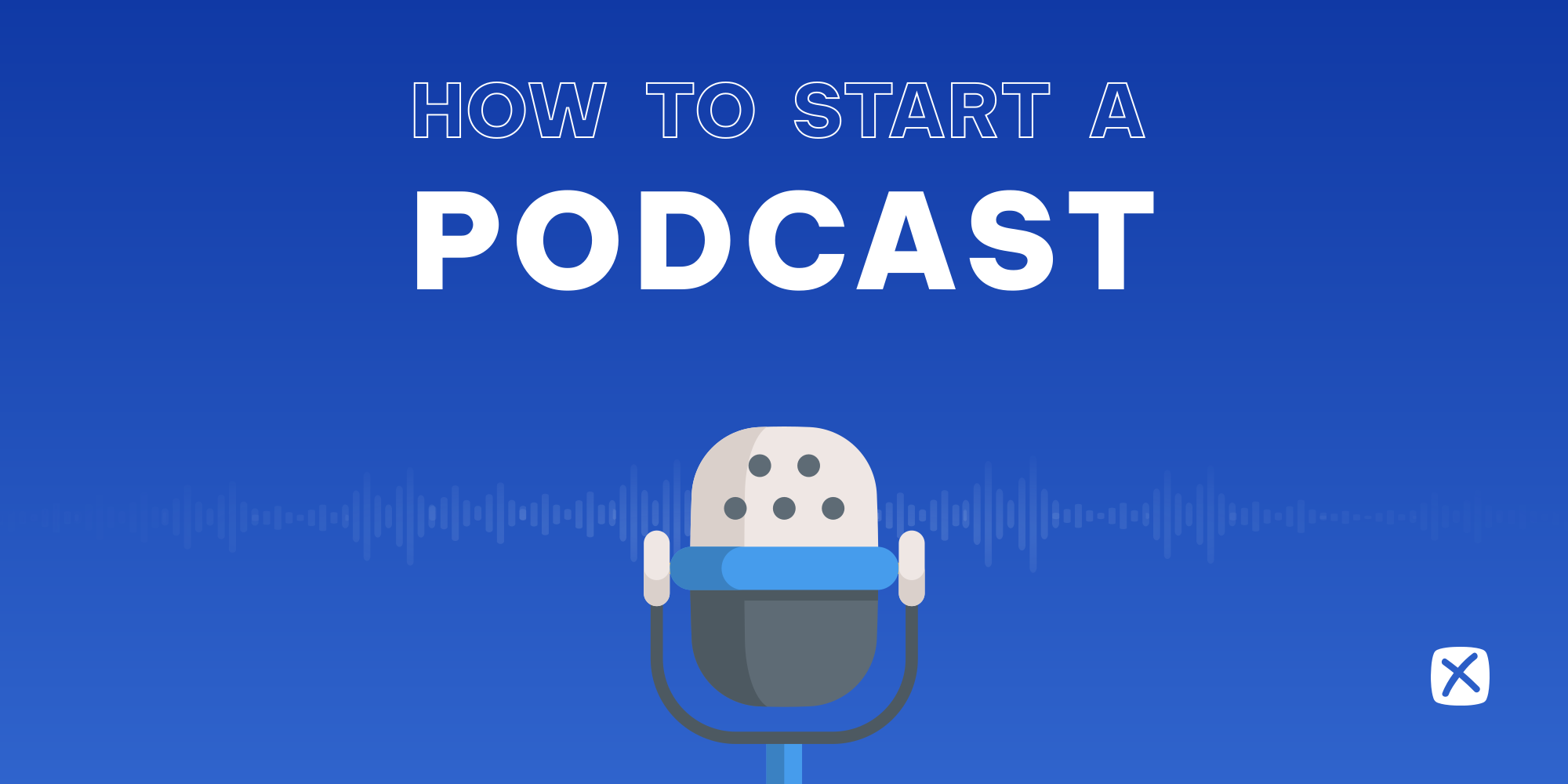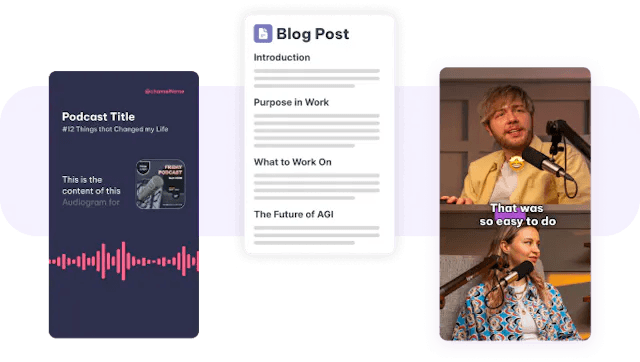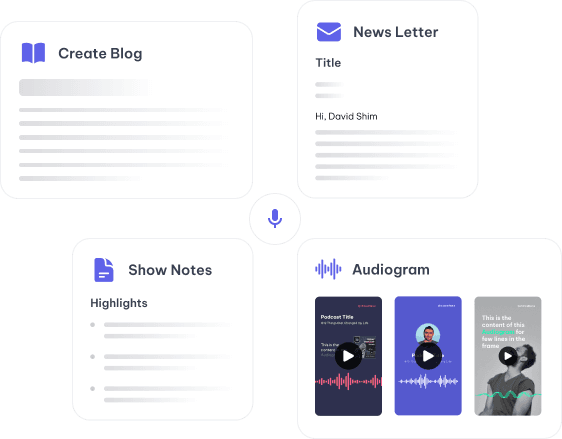Podcast MarketingSocial Media MarketingDigital MarketingPodcasting TipsUltimate Guide To Podcast Marketing: Essential Tips to Launch and GrowHethal Solanki
Hethal Solanki
10 min read
Hethal Solanki

Podcasting is rapidly gaining popularity, with the global market expected to reach $130.63 billion by 2030 and over 464.7 million listeners worldwide in 2023. If you have an idea worth sharing and want to tap into this growing audience, now is the perfect time to start a podcast.
However, establishing an audience requires investing time in podcast marketing strategies, including podcast editing, marketing a content podcast, marketing for podcasts, podcast SEO, podcast reviews, podcast format, how to promote a podcast, how to advertise a podcast, promote podcast, podcast social media, podcast branding, social media marketing, repurposing podcasts, and effective marketing strategies.
This blog is for you if you are thinking of starting your podcast and learning how to market podcasts with AI.
Lay A Strong Foundation
Love your topic
It's crucial to choose a podcast niche that you truly enjoy. Podcasting can be challenging, so to avoid podfading (abandoning your podcast). Your passion for the topic will shine through the discussion, making it more engaging for listeners and planning your podcast content strategy.
Do your research
Ideally, your podcast should focus on a topic that you understand well to display your thought leadership. If you have prior knowledge of the subject, you'll have an easier time discussing it in depth. Additionally, research trending topics in your industry or subjects that are on everyone's mind.
Focus on evergreen topics that are attractive year-round, as shows relevant only during specific periods may struggle to grow an audience. Offer something unique that no other host can provide. This could be a special perspective, expertise, or approach that gives people a reason to listen to your show over others.
Be timely
While evergreen topics are essential, it's also important to include current and address topics that are relevant and timely in your content planning. What's changing in your industry or the world that people want to learn more about? Incorporating these timely subjects can make your podcast high quality, more engaging, and valuable to listeners.
Theme each episode
It's important to have a clear theme for each episode that aligns with your overall podcast topic. This theme should center on the interests and problems faced by your target audience, which you can develop into a listener persona. Once you've attracted a small audience, you can refine your listener persona and theme based on their feedback and reactions.
Hook listeners at the beginning
The introduction sets the stage for the episode's primary content, orienting listeners to what you will discuss and how it is relevant to them. A compelling introduction can hook listeners and encourage them to continue listening to the rest of the episode.
Know Your Audience
Get inside your audience's head
Understanding your audience's pain points and problems is crucial for creating resonant content. You need to demonstrate that you grasp their issues so you can directly address the solutions they seek. People engage with content they can relate to, so showing you understand their problems provides an incentive to continue following you.
Letting your audience know you want their input on future topics shows you're invested in the format and value their perspectives. It also helps build a personal connection, demonstrating that you're listening to them as well.
Use data
Defining your audience is an ongoing process that will take time. Thankfully, by analyzing podcast data like host statistics and demographic information, you can monitor your listener journey and gain a clear picture of who your audience is. This data empowers you to adapt your podcast to better appeal to your listeners' needs and interests.
Continually tracking these quantitative and qualitative data points allows you to develop your niche in a way that facilitates growth.
Build Online Community
Starting an online group for your podcast provides a space where everyone can interact and chat, transforming casual listeners into a devoted community. An engaged group validates your ideas through valuable feedback, helping improve your podcast and business while making customers feel valued.
Encourage regular interaction by ending posts with questions that spur conversation and engagement, as algorithm favors active posts. While promoting your own episodes, also share other valuable content from partners with similar audiences.
Provide unique value beyond just repurposing podcast episodes, like deep-diving niche topics, hosting guest Q&As, or discussing listener questions.

Engage with your DMs
Reaching out to potential clients or collaborators via direct messages (DMs) on social media is a personal way to connect. Respond to their Stories, ask questions, or comment on their prompts to naturally start conversations and find common ground.
Create listener's Persona
As with any successful venture, having a clear idea of your target audience leads to better engagement. While recording your first podcast, remember who the content is actually for by identifying characteristics like gender, age, location, interests, and lifestyles.
Creating listener personas that flesh out your ideal audience's unmet needs is crucial. If you find your initial niche doesn't effectively target them, take your development in a different direction. Promote your podcast's Facebook, Reddit, and other online group through channels like your email list, website, and paid ads tailored to your target audience.
Digital And Content Marketing
Use paid ads
Paid advertising provide a fast and effective way to promote podcasts and increase brand awareness. Unlike content marketing, paid ads can quickly grow your audience in a matter of weeks.
Popular platforms for paid podcast digital marketing & advertising include: Google ads, Facebook ads, Instagram ads, Snapchat ads, TikTok ads and LinkedIn ads.
When choosing a platform, consider your podcast's niche or industry and the ability to target your desired audience effectively. Test different ad formats and track metrics like click-through rates (CTRs) to optimize your campaigns.

Word of Mouth
Word of mouth is still one of the best ways to promote your podcast. The top influence is when your podcast gets mentioned on another podcast in the same genre, you appear as a guest, or you interview someone from that genre. This goes a long way for your personal branding.
Cross-promotion strategies you can make use of are Ad swaps with other podcasts, content collaboration, social media collaboration, guest podcasts, and newsletters.
Use search engine optimization
Podcast SEO is the strategy of optimizing your podcasts to boost their visibility on search engine results pages (SERPs), increasing the chances of potential listeners finding your shows through search traffic.
Key podcast SEO includes:
- Keyword research: Identify and include relevant keywords for your podcast episodes in strategic places like titles, descriptions, and transcripts.
- Transcription: Transcribe episodes to give search engines written content to analyze, increasing relevance for related searches.
- Quality over quantity: Focus on producing high-quality, authoritative content to remain relevant and build authority with listeners.
- Metadata optimization: Add keywords to meta descriptions and titles for your podcast pages to help search engines understand your content better.
- Claim and verify your channel: Increase the chances of being promoted in relevant searches across Google devices.
- Content repurposing: Repurpose podcast content into blog posts and articles, enhancing SEO and providing opportunities for cross-promotion through guest posting or industry lists. Repurposing is one of the best content marketing podcast strategy which helps you to increase audience reach and content engagement.
- Link building: Develop a link-building strategy by appearing as a guest on other podcasts, asking for reviews, creating visuals others can use, and getting listed on industry podcast directories.
Cross-promote with guests
As mentioned earlier, cross-promotion with guests is an effective way to tap into their existing audiences and gain new listeners.
- Creating shareable snippets, quotes, or visuals from their appearance.
- Collaborating on social media by mentioning or tagging each other
- Making guest appearances on each other's shows
- Leveraging email lists to inform subscribers about collaborations
Implement email marketing
Email marketing is a powerful tool to bridge the gap between episodes, keep listeners engaged, and grow your fanbase. Have a strong Call-To-Action for audience to engage with your brand.
To implement email marketing, use strategies like:
- Promoting your podcast and collecting email signups through website pop-ups, landing pages, and social media
- Offering lead magnets like valuable information in exchange for email addresses
- Creating engaging email content like show notes, behind-the-scenes footage, discussion points, and exclusive offers
- Segmenting your audience for personalized content
- Sending automated campaigns based on subscriber actions or criteria
- Tracking metrics to optimize your email strategy

Leveraging AI for Podcast Marketing
To streamline your podcast content marketing efforts and amplify your reach, consider leveraging AI for it. Exemplary AI can significantly enhance your podcast marketing strategy by helping you repurpose podcast content efficiently. You can transform your podcast episodes into various content formats such as blog posts, social media snippets, and email newsletters, saving time and ensuring consistent quality across all platforms.

Exemplary AI offers features that:
- Automate Transcription: Quickly and accurately transcribe your podcast episodes, making it easier to create written content for SEO purposes.
- Generate Blog Posts: Convert your podcast discussions into well-structured blog articles, expanding your content reach. Share weekly newsletter to your active listeners and to the ones who missed your episode.
- Create Social Media Content: Produce engaging snippets and quotes from your podcasts to share on social media, enhancing audience engagement. This can be used for your paid ads and also act as a teaser to your upcoming episodes.
- Optimize Content for SEO: Use AI to identify and incorporate relevant keywords, boosting your content's visibility in search engines.
- Analyze Audience Data: Gain insights into listener behavior and preferences to tailor your content more effectively.
Additional Tips
Don't pay too much attention to stats!
Obsessing over podcast statistics can be counterproductive in the starting stage. Focus on creating high-quality content and building genuine connections with your audience instead.
Put fear and doubt on the shelf
Fear and self-doubt are normal when starting a podcast. Combat these feelings by trusting your unique perspective and seeking support from others. Forget the "shoulds" and embrace your authentic voice to overcome uncertainty and share your message.
Have a multi-year plan
Adopt a long-term mindset and be adaptable. Consistently deliver compelling content to retain listeners, and be open to feedback and innovation. Flexibility and willingness to pivot are key to evolving and succeeding in podcasting.
Be passionate
Choose a podcast niche you're passionate about to maintain motivation. Your enthusiasm will engage listeners, and focusing on evergreen topics can help attract a steady audience. Offer a unique perspective to stand out in a crowded field.
Don't wait for organic growth!
Combine organic growth with strategic marketing to accelerate your podcast's reach. While organic efforts are essential, ads can significantly boost your audience without causing burnout. Balance both approaches for optimal growth.
Be willing to evolve
Consistency in content quality and schedule builds trust and loyalty. However, stay flexible and open to change to keep your podcast relevant and innovative, adopt multi-channel approach to promote your podcast. Embrace feedback, take risks, and adapt to new trends for long-term success.
Conclusion
In conclusion, launching a successful podcast requires a well-crafted strategy that combines laying a solid foundation, understanding your audience, leveraging digital and content marketing with podcast techniques, and effectively utilizing social networking.
However, as you embark on this journey, it's essential to embrace the power of AI content creation tools like Exemplary AI, which can streamline your marketing efforts and amplify your reach.
FAQs
What is podcast marketing?
Podcast marketing involves promoting your podcast to increase its visibility, grow your listener base, and build a community around your content. This can include strategies such as optimizing for podcast SEO, engaging in cross-promotion, leveraging email marketing, and repurposing podcast content into various formats to reach a broader audience with podcast social media marketing.
How to market a podcast?
Marketing a podcast involves several steps:
- Define Your Audience: Understand who your listeners are and what they want.
- Optimize for SEO: Use keywords, transcriptions, and metadata to make your podcast discoverable.
- Leverage Social Media: Share engaging content, snippets, and visuals from your podcast on platforms like Facebook, Instagram, and Twitter.
- Use Paid Ads: Promote your podcast through paid advertising on platforms like Google, Facebook, and Instagram.
- Engage in Cross-Promotion: Partner with other podcasters, appear as a guest on other shows, and promote each other’s content.
- Repurpose Content: Turn your podcast episodes into blog posts, articles, and social media content.
- Build a Community: Create a Facebook group or online community to engage with your listeners directly.
- Email Marketing: Use email campaigns to keep your audience informed and engaged between episodes.
How to create a podcast?
Launching a podcast as a beginner can be huge task, follow this step-by-step guide:
- Choose a Niche: Select a topic you are passionate about and that has an audience.
- Plan Your Content: Outline your episodes, themes, and format.
- Get the Right Equipment: Invest in a good microphone, headphones, and recording software.
- Record and Edit: Record your episodes and edit them for clarity and quality.
- Create Artwork and Branding: Design a logo and create a brand identity for your podcast.
- Host and Distribute: Choose a podcast hosting service and distribute your podcast on platforms like Apple Podcasts, Spotify, and Google Podcasts.
- Promote Your Podcast: Use social media, SEO, email marketing, and cross-promotion to reach your audience.
What is a podcast target market?
A podcast target market is the specific group of people you aim to reach with your podcast. This includes demographics such as age, gender, location, interests, and behaviors. Understanding your target market helps you create content that resonates with them and tailor your marketing strategies to reach this audience effectively.
Is podcast content marketing?
Yes, podcast content can be a powerful form of content marketing strategy. It involves creating and sharing valuable, relevant, and consistent content to attract and retain a clearly defined audience. Podcasts help establish authority, build relationships with listeners, drive engagement and business growth across other marketing channels.

